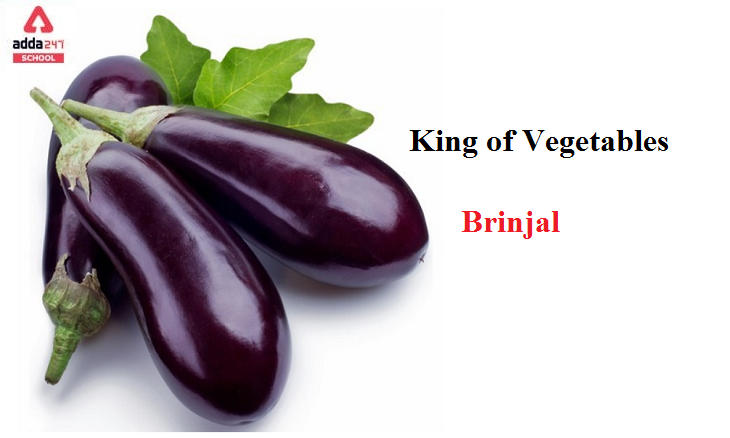King of Vegetables
King of Vegetables- Brinjal: We all need vegetables in our diet and of course, it is beneficial for our health. But have we ever wondered about what vegetable has acquired the crown for being ‘The king of vegetables’? Let’s read and know about why and how is that particular vegetable called ‘The king of vegetables’.
Read About: Red Book
King of vegetables in India
Brinjal, also known as baigan, has become increasingly popular in both vegetarian and non-vegetarian cuisines. The stunningly rich and glossy purple covering of the brinjal, as well as the meaty yet high nutritional white, earned it the title of King of Vegetables. The nightshade family Solanaceae includes eggplant, aubergine, and brinjal. This fruit of Solanum melongena is edible and is grown all over the world. Brinjal belongs to the nightshade family, which means that both the fruit and the flower of the plant are edible.
Read About: National vegetable of India
Who is the king of vegetables potato or brinjal?
The spongy, absorbent fruit, which is most typically purple, is utilised in a variety of cuisines. It is a berry by botanical definition and is commonly used as a vegetable in cooking.
It is linked to the tomato, chilli pepper, and potato as members of the Solanum genus. Moreover, albeit the tomato, chilli pepper, and potato are New World plants, whilst the eggplant is Old World. Its skin and seeds can be eaten, just like a tomato, but it’s normally served cooked, like a potato. Its skin and seeds can be eaten, just like a tomato, but it’s normally served cooked, like a potato. Eggplant has a low nutritional value in terms of macronutrients and micronutrients, but its capacity to absorb oils and aromas into its flesh when cooked widens its culinary applications.
It was domesticated from the wild nightshade species thorn or bitter apple, S. incanum, most likely through two separate domestications in South Asia and East Asia.
The fruit is botanically classed as a berry. It contains countless small, soft, edible seeds that taste bitter like tobacco. This is because these edible seeds contain or are covered in nicotinoid alkaloids.
Read About: Biodiversity
King of Vegetables in India
In North American and Australian English, eggplant is a common name. The term “eggplant,” first reported in 1763, was initially applied to white cultivars that resemble hen’s eggs. Garden egg is a phrase that dates back to 1811 for the white, egg-shaped kinds of eggplant fruits. The term “vegetable egg” was also used between 1797 and 1888, according to the Oxford English Dictionary.
While the English word eggplant was coined, most of the other European names for the plant are derived from the Arabic word binjn. Binjn is an Arabic loanword with earliest verifiable origins in Dravidian languages.
In North American and Australian English, eggplant is a common name. The term “eggplant,” first reported in 1763, was initially applied to white cultivars that resemble hen’s eggs. Garden egg is a phrase that dates back to 1811 for the white, egg-shaped kinds of eggplant fruits. The term “vegetable egg” was also used between 1797 and 1888, according to the Oxford English Dictionary.
Aubergine (together with French dialectal versions such as albergine, albergaine, albergame, and belingèle) is derived from the Spanish term alberenjena. After that, the French name was imported into British English, first appearing in the late eighteenth century.
In Southern American English, the plant is called guinea squash. The name guinea came from the fact that the fruits were traditionally linked with West Africa.
It has been dubbed ‘Jew’s apple,’ owing to a popular belief that the fruit was first brought to the West Indies by Jews.
King of Vegetables: Cooking Brinjal
Raw eggplant has a bitter, astringent flavour, but when cooked, it becomes tender and has a deep, complex flavour. Before cooking, rinse, drain, and salt the sliced fruit to remove the bitterness. The fruit has the ability to absorb fats and sauces from cooking, which may enhance the flavour of eggplant recipes.
Many countries employ eggplant in their cuisines. It’s sometimes utilised as a meat replacement in vegan and vegetarian dishes. It is because of its texture(flesh of the eggplant is silky smooth) and weight. The seeds do not need to be removed because they are small, soft, and edible. Even the skin is thin and edible, thus it needs not to be peeled.
When preparing an eggplant for cooking, the green area at the top, known as the calyx, must be removed.
Steamed, stir-fried, pan-fried, deep-fried, grilled, roasted, stewed, curried, or pickled eggplant are all options. It’s possible to fill it. Cooking using fat is common, but not always.









 CUET Result 2025 OUT (Today) @cuet.nta.n...
CUET Result 2025 OUT (Today) @cuet.nta.n...
 AKTU One View Result 2025 Out for Odd Se...
AKTU One View Result 2025 Out for Odd Se...
 SAMS Odisha +3 Third Selection Merit Lis...
SAMS Odisha +3 Third Selection Merit Lis...









